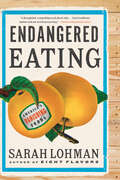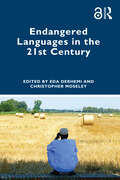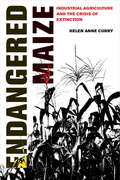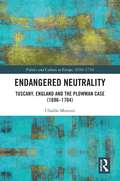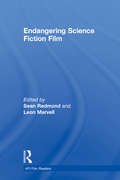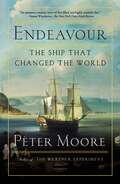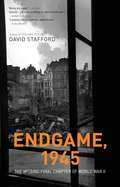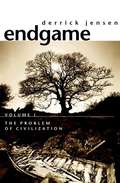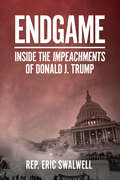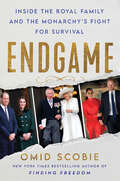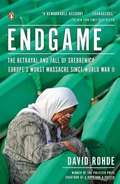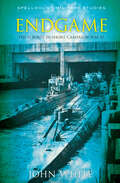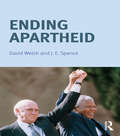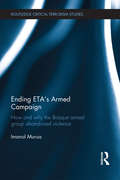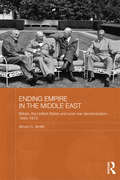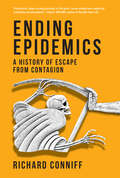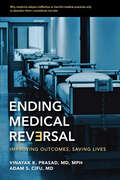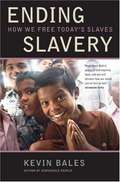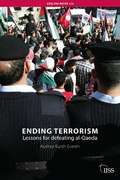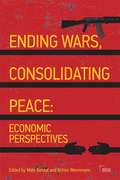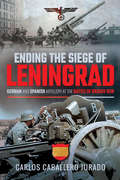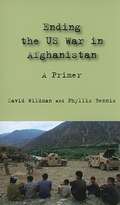- Table View
- List View
Endangered Eating: America's Vanishing Foods
by Sarah LohmanWinner of the 2024 Ohioana Book Award in Nonfiction A New York Times Book Review Editors' Choice • A Food & Wine Best Book of 2023 • An Eater Best Food Book, Fall 2023 American food traditions are in danger of being lost. How do we save them? Apples, a common New England crop, have been called the United States' "most endangered food." The iconic Texas Longhorn cattle is categorized at "critical" risk for extinction. Unique date palms, found nowhere else on the planet, grow in California’s Coachella Valley—but the family farms that caretake them are shutting down. Apples, cattle, dates—these are foods that carry significant cultural weight. But they’re disappearing. In Endangered Eating, culinary historian Sarah Lohman draws inspiration from the Ark of Taste, a list compiled by Slow Food International that catalogues important regional foods. Lohman travels the country learning about the distinct ingredients at risk of being lost. Readers follow Lohman to Hawaii, as she walks alongside farmers to learn the stories behind heirloom sugarcane. In the Navajo Nation, she assists in the traditional butchering of a Navajo Churro ram. Lohman heads to the Upper Midwest, to harvest wild rice; to the Pacific Northwest, to spend a day wild salmon reefnet fishing; to the Gulf Coast, to devour gumbo made thick and green with filé powder; and to the Lowcountry of South Carolina, to taste America’s oldest peanut—long thought to be extinct. Lohman learns from those who love these rare ingredients: shepherds, fishers, and farmers; scientists, historians, and activists. And she tries her hand at raising these crops and preparing these dishes. Each chapter includes two recipes, so readers can be a part of saving these ingredients by purchasing and preparing them. Animated by stories yet grounded in historical research, Endangered Eating gives readers the tools to support community food organizations and producers that work to preserve local culinary traditions and rare, cherished foods—before it’s too late.
Endangered Languages
by Sarah G. ThomasonMost of the 7,000 languages spoken in the world today will vanish before the end of this century, taking with them cultural traditions from all over the world, as well as linguistic structures that would have improved our understanding of the universality and variability of human language. This book is an accessible introduction to the topic of language endangerment, answering questions such as: what is it? How and why does it happen? Why should we care? The book outlines the various causes of language endangerment, explaining what makes a language 'safe', and highlighting the danger signs that threaten a minority language. Readers will learn about the consequences of losing a language, both for its former speech community and for our understanding of human language. Illustrated with case studies, it describes the various methods of documenting endangered languages, and shows how they can be revitalised.
Endangered Languages and New Technologies
by Mari C. JonesAt a time when many of the world's languages are at risk of extinction, the imperative to document, analyse and teach them before time runs out is very great. At this critical time new technologies such as visual and aural archiving, digitisation of textual resources, electronic mapping and social media, have the potential to play an integral role in language maintenance and revitalisation. Drawing on studies of endangered languages from around the world - Europe, Asia, Africa and North and South America - this volume considers how these new resources might best be applied, and the problems that they can bring. It also re-assesses more traditional techniques of documentation in light of new technologies and works towards achieving a practicable synthesis of old and new methodologies. This accessible volume will be of interest to researchers in language endangerment, language typology and linguistic anthropology, and to community members working in native language maintenance.
Endangered Languages in the 21st Century
by Christopher Moseley Eda DerhemiEndangered Languages in the 21st Century provides research on endangered languages in the contemporary world, the challenges still to be faced, the work still to be done, and the methods and practices that have come to characterize efforts to revive and maintain disadvantaged indigenous languages around the world. With contributions from scholars across the field, the book brings fresh data and insights to this imperative, but still relatively young, field of linguistics. While the studies acknowledge the threat of losing languages in an unprecedented way, they focus on cases that show resilience and explore paths to sustainable progress. The articles are also intended as a celebration of the 25 years’ work of the Foundation for Endangered Languages, and as a parting gift to FEL’s founder and quarter-century chair, Nick Ostler. This book will be informative for researchers, instructors, and specialists in the field of endangered languages. The book can also be useful for university graduate or undergraduate students, and language activists. The Open Access version of this book, available at www.taylorfrancis.com, has been made available under a Creative Commons Attribution-Non Commercial-No Derivatives 4.0 license.
Endangered Maize: Industrial Agriculture and the Crisis of Extinction
by Helen Anne CurryCharting the political, social, and environmental history of efforts to conserve crop diversity. Many people worry that we're losing genetic diversity in the foods we eat. Over the past century, crop varieties standardized for industrial agriculture have increasingly dominated farm fields. Concerned about what this transition means for the future of food, scientists, farmers, and eaters have sought to protect fruits, grains, and vegetables they consider endangered. They have organized high-tech genebanks and heritage seed swaps. They have combed fields for ancient landraces and sought farmers growing Indigenous varieties. Behind this widespread concern for the loss of plant diversity lies another extinction narrative that concerns the survival of farmers themselves, a story that is often obscured by urgent calls to collect and preserve. Endangered Maize draws on the rich history of corn in Mexico and the United States to uncover this hidden narrative and show how it shaped the conservation strategies adopted by scientists, states, and citizens. In Endangered Maize, historian Helen Anne Curry investigates more than a hundred years of agriculture and conservation practices to understand the tasks that farmers and researchers have considered essential to maintaining crop diversity. Through the contours of efforts to preserve diversity in one of the world's most important crops, Curry reveals how those who sought to protect native, traditional, and heritage crops forged their methods around the expectation that social, political, and economic transformations would eliminate diverse communities and cultures. In this fascinating study of how cultural narratives shape science, Curry argues for new understandings of endangerment and alternative strategies to protect and preserve crop diversity.
Endangered Neutrality: Tuscany, England and the Plowman Case (1696–1704) (ISSN)
by Ubaldo MorozziAnalysing a struggle for neutrality amid a rapidly changing European scene, this book illustrates how the small state of Tuscany cunningly managed to preserve its sovereignty and independence during a dangerous diplomatic dispute with England.Endangered Neutrality follows the actions of William Plowman (1660-?), who sparked the dispute, and those of two of the main characters of the story, Iacopo Giraldi (1663-1738), Tuscan ambassador to England, and Lambert Blackwell (d.1727), English envoy to Tuscany. Through these privileged points of view, the reader is plunged into the highest levels of European politics and diplomacy of the period.This book offers a radically new approach to the study of Tuscan history, particularly in relation to the reign of Cosimo III de’ Medici. It underlines the weakness of the concept of the ‘small state’, showing how Tuscany managed openly to confront a much more powerful country such as England. Tuscany built a ‘system of neutrality’ which, leveraging the economic importance of the Mediterranean trade routes and of the port of Livorno, allowed the Grand Duchy to preserve its independence. Analysis of the case also offers a unique perspective on the functioning of the Tuscan and English diplomatic corps, assessing the impact of the Glorious Revolution on English diplomatic capabilities. Special attention is devoted to the importance of symbolism in diplomatic practice and to the role of trade and public opinion in resolving international disputes.
Endangering Science Fiction Film (AFI Film Readers)
by Sean Redmond Leon MarvellEndangering Science Fiction Film explores the ways in which science fiction film is a dangerous and endangering genre. The collection argues that science fiction's cinematic power rests in its ability to imagine ‘Other’ worlds that challenge and disturb the lived conditions of the ‘real’ world, as it is presently known to us. From classic films such as 2001: A Space Odyssey and Solaris to modern blockbusters including World War Z and Gravity, and directors from David Cronenberg to Alfonso Cuarón, contributors comment on the way science fiction film engages with dangerous encounters, liminal experiences, sublime aesthetics, and untethers space and time to question the very nature of human existence. With the analysis of a diverse range of films from Europe, Asia, North and South America, Endangering Science Fiction Film offers a uniquely interdisciplinary view of the evolving and dangerous sentiments and sensibility of this genre.
Endeavour: The Ship That Changed the World
by Peter Moore"An immense treasure trove of fact-filled and highly readable fun.” --Simon Winchester, The New York Times Book ReviewA Sunday Times (U.K.) Best Book of 2018 and Winner of the Mary Soames Award for HistoryAn unprecedented history of the storied ship that Darwin said helped add a hemisphere to the civilized worldThe Enlightenment was an age of endeavors, with Britain consumed by the impulse for grand projects undertaken at speed. Endeavour was also the name given to a collier bought by the Royal Navy in 1768. It was a commonplace coal-carrying vessel that no one could have guessed would go on to become the most significant ship in the chronicle of British exploration. The first history of its kind, Peter Moore’s Endeavour: The Ship That Changed the World is a revealing and comprehensive account of the storied ship’s role in shaping the Western world. Endeavour famously carried James Cook on his first major voyage, charting for the first time New Zealand and the eastern coast of Australia. Yet it was a ship with many lives: During the battles for control of New York in 1776, she witnessed the bloody birth of the republic. As well as carrying botanists, a Polynesian priest, and the remains of the first kangaroo to arrive in Britain, she transported Newcastle coal and Hessian soldiers. NASA ultimately named a space shuttle in her honor. But to others she would be a toxic symbol of imperialism. Through careful research, Moore tells the story of one of history’s most important sailing ships, and in turn shines new light on the ambition and consequences of the Age of Enlightenment.
Endgame, 1945: The Missing Final Chapter of World War II
by David Stafford"War is too important to be left to the generals," Georges Clemenceau once famously remarked. Stafford (Centre for the Study of the Two World Wars, U. of Edinburgh, UK) adds, "the history of war is too important to be left to the military historians alone," especially as they tend to end their accounts with the immediate cessation of hostilities and neglect the importance of war's aftermath. His method of capturing some of the realities of the final days and immediate aftermath, through mid-summer 1945, of World War II, is to weave together the biographies of "a handful of individuals," including a German mother separated from her sons and imprisoned by the Nazis, a British commando witness to the aftermath of the horrors of the concentration camps, an American soldier in Italy, a war correspondent traveling with Gen. Patton's forces into Germany, a Canadian officer in Holland, a German-Jewish exile serving as a British secret agent in Austria, a New Zealand intelligence officer working in opposition to the communists in the disputed city of Trieste, an American paratrooper in Berlin involved in some the very first manifestations of the Cold War confrontation with the Soviets, and a woman involved with humanitarian work for concentration camp victims. Annotation ©2008 Book News, Inc., Portland, OR (booknews.com)
Endgame, Volume 1: The Problem of Civilization
by Derrick JensenEndgame, Volume 1 builds on a series of simple but increasingly provocative premises: for example, "The needs of the natural world are more important than the needs of any economic system" and "Love does not imply pacifism." A brilliant weaving together of piercing analysis and elegant prose, Endgame leads us to see that we can re-imagine our world. Derrick Jensen is the acclaimed author of A Language Older Than Words and The Culture of Make Believe, among many others. Author, teacher, activist, small farmer, and leading voice of uncompromising dissent, he regularly stirs auditoriums across the country with revolutionary spirit. Jensen holds a degree in creative writing from Eastern Washington University, a degree in mineral engineering physics from the Colorado School of Mines, and has taught at Eastern Washington University and Pelican Bay State Prison.
Endgame: Inside the Impeachments of Donald J. Trump
by Eric SwalwellFrom a Democratic congressman and member of the House intelligence committee, an insider&’s account of the impeachments of former president Donald Trump. How do you stop a rogue president? How do you protect a country from a man who lies, who obstructs justice, and who seeks to cheat with foreign powers to get reelected? Our constitution offers one remedy: impeachment. On December 18, 2019, President Donald J. Trump became just the third president in US history to be impeached by the House of Representatives. And then, on January 13, 2021, he became the first president to be impeached twice. In Endgame, Congressman Eric Swalwell offers his personal account of his path to office all the way to House impeachment manager, and how he and his colleagues resisted, investigated, and impeached a corrupt president. Swalwell takes readers inside Congress and through the impeachment process, from Trump&’s disgraceful phone call with the Ukrainian president to depositions in the SCIF, and from caucus meetings and conversations with the Speaker to the bombshell public hearings and the historic vote, and then what followed—the 2020 election, the insurrection on January 6, 2021, the second impeachment and second trial. Endgame is fascinating, a gripping read by a unique witness to extraordinary events.
Endgame: Inside the Royal Family and the Monarchy's Fight for Survival
by Omid ScobieEndgame, the explosive book from longtime royal journalist Omid Scobie and author of the international blockbuster Finding Freedom, is a penetrating investigation into the current state of the British monarchy—an unpopular king, a power-hungry heir to the throne, a queen willing to go to dangerous lengths to preserve her image, and a prince forced to start a new life after being betrayed by his own family.Queen Elizabeth II’s death ruptured the already-fractured foundations of the House of Windsor—and dismantled the protective shield around it. With an institution long plagued by antiquated ideas around race, class and money, the monarchy and those who prop it up are now exposed and at odds with a rapidly modernizing world. Relying on his vast experience as a royal reporter and over a decade of conversations and interviews with current and former Palace staff, trusted friends of the royals and even the family members themselves, Scobie pulls back the curtain on an institution in turmoil to show what the monarchy must change in order to survive. This is the monarchy’s endgame. Do they have what it takes to save it?
Endgame: The Betrayal and Fall of Srebrenica, Europe's Worst Massacre Since World War II
by David Rohde'Powerful. . . definitive. . . Rohde tells the Srebrenica story with all the shades of gray the truth demanded. "-The Washington Post In 1996, at the height of the Bosnian wars, a correspondent for The Christian Science Monitor names David Rohde uncovered a horrifying story that became an enduring symbol of the genocidal nature of that conflict, earning him his first Pulitzer Prize. Endgame is the full-length narrative of the nightmare he stumbled upon in the town of Srebrenica, where a massacre of historic proportions has been allowed to happen due to the negligence of the United States, NATO and the United Nations. Told through the eyes of the soldiers, peacekeepers, and civilians who were there, this is a vital, unforgettable work of history about an atrocity that could have been prevented. .
Endgame: The U-boats In-shore Campaign 1944-45
by John WhiteBy the time of the Normandy invasion in June 1944, the U-boats were a beaten force, hunted and harried wherever they appeared by Allied warships and aircraft. The U-boats proved to be little more than pin pricks against the landings, and advancing Anglo-American armies had driven them out of their French west Atlantic bases all the way back to Norway by September 1944. Yet the U-boat force mounted a sustained and effective campaign from their Norwegian bases. Admiral Doenitz revived the U-boat War against Allied merchant shipping with new inventions in the face of a massive Allied naval defence while Germany collapsed. The east coast waters were shallow and heavily mined. Other German naval forces made a significant contribution. The campaign also saw the first and only appearances of the new Type XXIII electric U-boats, a radically new submarine design, the forerunner of modern diesel-electric submarines. John White examines in detail the U-boat reaction to the Normandy Landings in June 1944, the Norwegian U-boat bases, German torpedoes, the interference by U-boat Command, the Scapa Flow carrier operation and the Allied response up to the final surrender in May 1945.
Endiabladamente atractivo (Hermanas Atwood #Volumen 3)
by Raquel Gil EspejoLondres, 1872. En sus corazones, la atracción y la duda se fueron tornando abismo, deseo..., amor. Frances Atwood es una soñadora que plasma todo cuanto siente en resmas de papel. Desde muy pequeña, un solo deseo ronda por su mente: hacerse un hueco en el mundo de las letras. Admiradora de Jane Austen o de Christina Rossetti, Frances dista mucho de ser una jovencita casadera centrada en encontrar marido. Pese a ejercer un fuerte atractivo entre los hombres, su interés hacia ellos es prácticamente nulo. Ella se mueve en línea recta, sin curvaturas, sin baches, y es muy probable que no entre en sus planes tropezarse con alguien que la haga vibrar y que la lleve a salirse del sendero marcado. Gilbert Nightingale es profesor de ciencias en el King's College de Londres. Gilbert disfruta sabiéndose el centro de atención y parece vanagloriarse de ello. Se trata de un dandi que se vale de su endiablado atractivo para conquistar a cualquier joven que se cruce en su camino. Frances y Gilbert coincidieron por primera vez en el Museo Británico, un año atrás; pero será en el baile organizado por los duques de Riderland donde sus caminos vuelvan a confluir. El profesor es muy consciente del efecto que causa en las mujeres. En todas... menos en Frances Atwood, quien lo considera vanidoso, arrogante y superficial al tiempo que no puede dejar de admirar esos dos hoyuelos que se dibujan a ambos lados de sus mejillas cuando sonríe. Gilbert anhelará compartir el resto de sus días, y también su intimidad, con Frances, pero... ¿estará a la altura de la joven poeta? ¿Será el profesor de ciencias el hombre elegido por su corazón? ¿Se valdrá de sus encantos para irla conquistando poco a poco, pese al rechazo que su desfachatez le causa? ¿Se cumplirá el anhelo de Frances de convertirse en escritora a pesar del pánico que le genera llegar a ser denostada por la crítica sociedad londinense? Y, de ser así, ¿estará Gilbert a su lado?
Ending Apartheid (Turning Points)
by Jack Spence David WelshThe release of Nelson Mandela from twenty-seven years imprisonment in 1990 and the free elections which followed four years later were among the most dramatic events of the twentieth century. David Welsh and J. E. Spence here examine the complex forces which lay behind that drama. They chart the rise and decline of apartheid ideology in South Africa, the internal insurrection and increased international isolation which characterised the 1980s and the political roller-coaster ride of the period after 1990 as constitutional negotiations got underway. Based on extensive interviews with those involved, Ending Apartheid traces the negotiating process in penetrating detail, noting the political skills of de Klerk and Mandela in keeping their potentially unruly constituencies in line and avoiding the major violence that many had predicted. Reaching agreement on a democratic constitution was a major achievement that surprised many sceptical observers, but the book ends on a more sombre note. Reviewing the period subsequent to the transition, it argues that while progress has been made, the future of South Africa's democracy is still far from assured. Written by two eminent scholars with decades of experience teaching in the field, Ending Apartheid is an invaluable resource for all students of South African politics seeking a deeper understanding of a defining episode in recent history.
Ending ETA's Armed Campaign: How and Why the Basque Armed Group Abandoned Violence (Routledge Critical Terrorism Studies)
by Imanol MuruaThis book explains how and why the Basque separatist armed group ETA decided to end its armed campaign against the Spanish state. The ETA’s armed campaign for Basque independence lasted fifty years and led to more than 800 casualties. This book analyzes the factors that led to ETA ending its campaign of violence in 2011, despite having yet to achieve its political objectives. It explains how the Basque pro-independence movement’s political leadership won an internal battle and brought ETA to a position in which abandoning violence was the only feasible choice. The work argues that the key factor leading to the cessation of violence was the loss of support for armed struggle within the pro-independence social base, and it examines why and how that support decreased so decisively. Written by a former journalist, the narrative is based on more than 30 interviews, including former members of ETA, Spanish judges, former ministers of the Spanish government, political leaders of all Basque political parties—from the Nationalist Left to the Partido Popular (PP)—and international mediators. As such, it is the first book to recount in detail the inside story of the internal struggle within the Nationalist Left movement, and particularly between the political party Batasuna and ETA. This book will be of much interest to students of political violence, ethnic conflict, nationalism, Spanish politics, security studies, and IR.
Ending Empire in the Middle East: Britain, the United States and Post-war Decolonization, 1945-1973 (Routledge Studies in Middle Eastern History)
by Simon C. SmithThis book is a major and wide-ranging re-assessment of Anglo-American relations in the Middle Eastern context. It analyses the process of ending of empire in the Middle East from 1945 to the Yom Kippur War of 1973. Based on original research into both British and American archival sources, it covers all the key events of the period, including the withdrawal from Palestine, the Anglo-American coup against the Musaddiq regime in Iran, the Suez Crisis and its aftermath, the Iraqi and Yemeni revolutions, and the Arab-Israeli conflicts. It demonstrates that, far from experiencing a ‘loss of nerve’ or tamely acquiescing in a transfer of power to the United States, British decision-makers robustly defended their regional interests well into the 1960s and even beyond. It also argues that concept of the ‘special relationship’ impeded the smooth-running of Anglo-American relations in the region by obscuring differences, stymieing clear communication, and practising self-deception on policy-makers on both sides of the Atlantic who assumed a contiguity which all too often failed to exist. With the Middle East at the top of the contemporary international policy agenda, and recent Anglo-American interventions fuelling interest in empire, this is a timely book of importance to all those interested in the contemporary development of the region.
Ending Epidemics: A History of Escape from Contagion
by Richard ConniffHow scientists saved humanity from the deadliest infectious diseases—and what we can do to prepare ourselves for future epidemics.After the unprecedented events of the COVID-19 pandemic, it may be hard to imagine a time not so long ago when deadly diseases were a routine part of life. It is harder still to fathom that the best medical thinking at that time blamed these diseases on noxious miasmas, bodily humors, and divine dyspepsia. This all began to change on a day in April 1676, when a little-known Dutch merchant described bacteria for the first time. Beginning on that day in Delft and ending on the day in 1978 when the smallpox virus claimed its last known victim, Ending Epidemics explains how we came to understand and prevent many of our worst infectious diseases—and double average life expectancy. Ending Epidemics tells the story behind &“the mortality revolution,&” the dramatic transformation not just in our longevity, but in the character of childhood, family life, and human society. Richard Conniff recounts the moments of inspiration and innovation, decades of dogged persistence, and, of course, periods of terrible suffering that stir individuals, institutions, and governments to act in the name of public health. Stars of medical science feature in this drama, but lesser-known figures also play a critical role. And while the history of germ theory is central to this story, Ending Epidemics also describes the importance of everything from sanitation improvements and the discovery of antibiotics to the development of the microscope and the syringe—technologies we now take for granted.
Ending Medical Reversal: Improving Outcomes, Saving Lives
by Vinayak K. Prasad Adam S. CifuWhy medicine adopts ineffective or harmful medical practices only to abandon them—sometimes too late.Medications such as Vioxx and procedures such as vertebroplasty for back pain are among the medical "advances" that turned out to be dangerous or useless. What Dr. Vinayak K. Prasad and Dr. Adam S. Cifu call medical reversal happens when doctors start using a medication, procedure, or diagnostic tool without a robust evidence base—and then stop using it when it is found not to help, or even to harm, patients.In Ending Medical Reversal, Drs. Prasad and Cifu narrate fascinating stories from every corner of medicine to explore why medical reversals occur, how they are harmful, and what can be done to avoid them. They explore the difference between medical innovations that improve care and those that only appear to be promising. They also outline a comprehensive plan to reform medical education, research funding and protocols, and the process for approving new drugs that will ensure that more of what gets done in doctors' offices and hospitals is truly effective.
Ending Terrorism: Lessons for defeating al-Qaeda (Adelphi series)
by Audrey Kurth CroninLike all other terrorist movements, al-Qaeda will end. While it has traits that exploit and reflect the current international context, it is not utterly without precedent: some aspects of al-Qaeda are unusual, but many are not. Terrorist groups end according to recognisable patterns that have persisted for centuries, and they reflect, among other factors, the counter-terrorist policies taken against them. It makes sense to formulate those policies with a specific image of an end in mind. Understanding how terrorism ends is the best way to avoid being manipulated by the tactic. There is vast historical experience with the decline and ending of terrorist campaigns, yet few policymakers are familiar with it. This paper first explains five typical strategies of terrorism and why Western thinkers fail to grasp them. It then describes historical patterns in ending terrorism to suggest how insights from that history can lay a foundation for more effective counter-strategies. Finally, it extracts policy prescriptions specifically relevant to ending the campaign of al-Qaeda and its associates, moving towards a post-al-Qaeda world.
Ending Wars, Consolidating Peace: Economic Perspectives (Adelphi series)
by Mats Berdal Achim WennmannThe transition from war to peace is fraught with tension and the risk of a return to bloodshed. With so much at stake, it is crucial that the international community and local stakeholders make sense of the complex mosaic of challenges, to support a lasting, inclusive and prosperous peace. Recent missions, such as in Afghanistan, Somalia, or Sudan, have highlighted the fact that there can be no one-size-fits-all approach to steering countries away from violence and towards stability. This Adelphi offers a series of economic perspectives on conflict resolution, to show how the challenges of peacebuilding can be more effectively tackled. From the need to marry diplomatic peacemaking with development efforts, and activate the private sector in the service of peacebuilding aims, to the use of taxes and natural resource revenues as a financial base for sustainable peace, this book considers how economic factors can positively shape and drive peace processes. It takes an unflinching look at the complex ways in which power and order may be manifested in conflict zones, where unpalatable compromises with local warlords can often be the first step towards a more lasting settlement. A difficult balance must be struck by peacemakers and peacebuilders in assisting countries and communities in their transitions out of war, for the consequences of failure for countries and the wider world are too grave. In distilling expertise from a range of disciplines, this Adelphi seeks to inform a more economically integrated and responsive approach to helping countries leave behind their troubled pasts and take a fuller role in constructing their futures.
Ending the Siege of Leningrad: German and Spanish Artillery at the Battle of Krasny Bor
by Carlos Caballero JuradoThis vivid combat history examines the role of German and Spanish artillery in the WW2 fight for control of Leningrad.When Nazi Germany invaded the Soviet Union in 1941, it quickly established a blockade around Leningrad that would become one of the longest and most destructive in history. In an attempt to break the blockade in 1943, the Red Army launched an offensive near the town of Krasny Bor. Previous works on the Battle of Krasny Bor have focused on the infantry involved, while little attention has been paid to the use of German and Spanish artillery in the conflict. In Ending the Siege of Leningrad, Spanish military historian Carlos Caballero Jurado corrects this oversight. Describing the action from an artilleryman’s point of view, Jurado puts the reader in the heart of the battle.
Ending the US War in Afghanistan: A Primer
by Phyllis Bennis David WildmanThe Bush Administration answered the terror attacks of September 11, 2001 with what it called the "global war on terror," first with the assault on Afghanistan and then the invasion of Iraq. More and more Americans joined the opposition to the Iraq war, but for many, Afghanistan remained "the good war." But was the war on Afghanistan ever a "good war?" And will President Obama's planned escalation of US troop presence in Afghanistan work? In this easy-to-read volume of "frequently asked questions," analysts David Wildman and Phyllis Bennis examine a wide range of key issues regarding the US war in Afghanistan.
